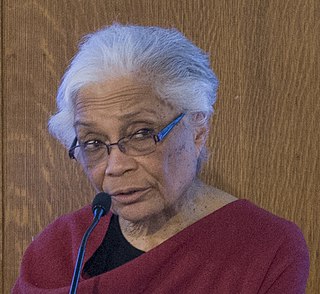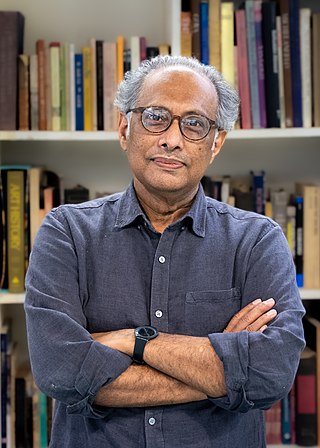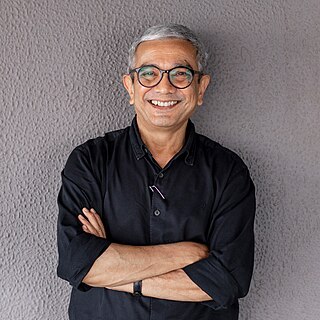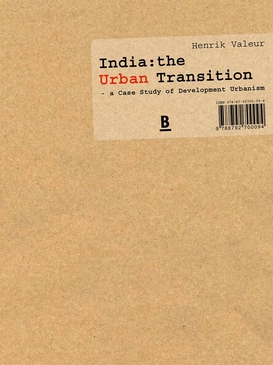Related Research Articles

New Urbanism is an urban design movement that promotes environmentally friendly habits by creating walkable neighbourhoods containing a wide range of housing and job types. It arose in the United States in the early 1980s, and has gradually influenced many aspects of real estate development, urban planning, and municipal land-use strategies. New Urbanism attempts to address the ills associated with urban sprawl and post-WW II suburban development.

The Indian Institute of Advanced Study (IIAS) is a research institute located in Shimla, India. It was set up by the Ministry of Education, Government of India in 1964 and started functioning from 20 October 1965. It is currently housed in the Rashtrapati Niwas.

Devaki Jain is an Indian economist and writer, who has worked mainly in the field of feminist economics. In 2006 she was awarded the Padma Bhushan, the third-highest civilian award from Government of India, for her contribution to social justice and the empowerment of women.

Gail Omvedt was an American-born Indian sociologist and human rights activist. She was a prolific writer and published numerous books on the anti-caste movement, Dalit politics, and women's struggles in India. Omvedt was involved in Dalit and anti-caste movements, environmental, farmers' and women's movements, especially with rural women.

Hafeez Sorab Contractor is an Indian architect. He has designed many skyscrapers in India, primarily in the city of Mumbai. As of 2019, he is the architect of the three tallest buildings in India – The 42 in Kolkata, and the twin towers of The Imperial in Mumbai. He was awarded the Padma Bhushan in January 2016 by the Government of India.

Sharon Egretta Sutton, is an American architect, educator, visual artist, and author. Her work is focused on community-based participatory research and design. She is a professor emerita at the University of Washington. In 1984, she became the first African American woman to become a full professor in an accredited architectural degree program while teaching at the University of Michigan. She has also taught at Parsons School of Design, and Columbia University.
Diana I. Agrest is a practicing architect and urban designer and an architecture and urban design theorist, in New York City.

Mitchell Joachim is an architect and urban designer. He is the Co-Founder of Terreform ONE, and a Professor of Practice at NYU. Previously he was the Frank Gehry Chair at University of Toronto and a faculty member at Pratt, Columbia, Syracuse, Washington, The New School, and the European Graduate School.

Gaétan Siew is a Mauritian architect.

Kazi Khaleed Ashraf is a Bangladeshi architect, urbanist and architectural historian. Writing from the intersection of architecture, landscape and the city, Ashraf has authored books and essays on architecture in India and Bangladesh, the work of Louis Kahn, and the city of Dhaka. His various writings on the architecture of Bangladesh have provided a theoretical ground for understanding both the historical and contemporary forms of architecture, while his written and design work on Dhaka advances that city as a "theorem" for understanding urbanism in a deltaic geography. Ashraf and contributing team received the Pierre Vago Journalism Award from the International Committee of Architectural Critics for the Architectural Design publication Made in India. He has also co-authored a number of publications with the architect Saif Ul Haque. Ashraf has recently established an international publication series called Locations: Anthology of Architecture and Urbanism that will present works and features from around the globe.
Helen Marian Lochhead is an Australian architect and urbanist who combines academic and expert advisory roles with practice. Her career has focused on the inception, planning, design, and delivery of complex urban projects ranging from city improvements programs to major urban regeneration projects. She has held numerous influential roles in government, industry and universities including Dean, Faculty of Built Environment and Pro Vice-Chancellor Precincts at UNSW Sydney, National President of the Australian Institute of Architects and Deputy Government Architect in NSW. She has served on various Panels and Boards including the NSW Independent Planning Commission, The Australian Heritage Council and the National Capital Authority.

Adèle Naudé Santos is a South African-born American architect and urban designer focused on low-income housing, campus architecture, and socially conscious design. She is the principal architect of Santos Prescott and Associates, based in San Francisco and Somerville, Massachusetts. She served as the Dean of the School of Architecture and Planning at Massachusetts Institute of Technology from 2003 to 2014. She became a Fellow of the American Institute of Architects in 1996.

Bimal Hasmukh Patel is an architect from Ahmedabad, India, with over 35 years of professional, research and teaching experience in architecture, urban design and urban planning. He was the President of CEPT University in Ahmedabad from July 2012 to January 2024. He leads HCP Design Planning and Management Private Limited, an architecture, planning and project management firm. He also founded Environmental Planning Collaborative, a not-for-profit, planning research and advocacy organization.

Anshu Gupta is an Indian entrepreneur. He founded the non-governmental organization Goonj. Goonj works on bridging urban and rural inequality. It does this by channelizing the urban surplus to initiate rural upliftment, disaster relief, and rehabilitation. Through Goonj, Anshu is building a parallel trash-based economy by creating barter between rural communities and urban surplus material. Anshu has been recognized by the Ramon Magsaysay foundation for his "creative vision in transforming the culture of giving in India".

India: the Urban Transition is a book by the Danish architect-urbanist Henrik Valeur, curator of an award-winning exhibition about the urban transition of China. The book is based on the author's collaboration with activists, bureaucrats, developers, entrepreneurs, researchers and students in India between 2010 and 2014. With experiences from both China and India, Henrik Valeur asks whether India can "use urbanization as a driver of economic, human and social development like China has done?"

Henrik Bjørn Valeur is a Danish architect-urbanist, founder and creative director of UiD (Denmark) and UiD Shanghai Co., Ltd (China), curator of CO-EVOLUTION: Danish/Chinese Collaboration on Sustainable Urban Development in China, which was awarded the Golden Lion at the Venice Biennale of Architecture in 2006, and author of the book India: the Urban Transition - a Case Study of Development Urbanism (2014), which is based on his experiences teaching, researching and practicing in India.
Vishaan Chakrabarti is an American architect and professor. He is the founder of Practice for Architecture and Urbanism (PAU), which is an architecture firm based in New York. In 2018 he was named a fellow of the American Institute of Architects. For a period of one year, from July 2020 to September 2021, Chakrabarti served as the Dean at the College of Environmental Design at UC Berkeley.
Richard M. Sommer is a Professor of Architecture and Urbanism and the Director of the Global Cities Institute at the John H. Daniels Faculty of Architecture, Landscape, and Design, University of Toronto. From 2009 until 2020, he was the Dean of the Daniels Faculty. Sommer was born in Philadelphia, and now resides in Toronto, Canada. Trained as an architect and urbanist, Sommer is a leader in architectural education and is a designer and scholar of the built environment.

The Obel Award is a global award presented annually to honour "recent and outstanding architectural contributions to human development all over the world."
Mihir R Bhatt is an Indian architect, researcher and urban planner based in Ahmedabad, Gujarat, India. He is the director of the All India Disaster Mitigation Institute (AIDMI), a local organization dedicated to mitigating the impact of disaster risks in India. Mihir Bhatt is actively involved in cutting edge initiatives and projects aimed at reducing risks and enhancing disaster preparedness and has extensive publications on topics related to vulnerability and disaster.
References
- ↑ http://www.elpais.com/articulo/sociedad/coche/quiere/cambiar/mundo/elpepisoc/20080111elpepisoc_1/Tes/ EL PAIS Reference
- ↑ "FSI | CDDRL - Draper Hills Summer Fellows Class of 2011".
- ↑ Manohar, Prathima (2006). Architect Hafeez Contractor. ISBN 9788190175807.